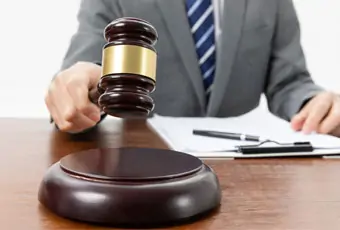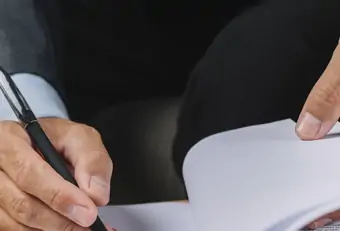Georgia Truck Accident Lawyer
Truck Accident Attorney in Georgia
If you hear that someone has been in a trucking accident, your first thought is probably that you hope that they are okay. That term, though, becomes a relative one very quickly. It’s very rare that someone is just “okay” after an accident with a truck.
Even when injuries are healed or the adjustment process has begun, if someone experiences lifelong injuries, there is still so much left to manage in the aftermath of an accident. For so many, the medical bills start to pile up, and they don’t get any easier to pay considering the lost wages from missing work. Those things don’t even account for the stress, mental anguish, pain, and difficulty adjusting to life following a serious accident.
If the accident wasn’t your fault, you are owed compensation for all these things under the law. In most cases, it will be an insurance company for the liable party who is legally responsible for paying these claims out.
However, they are for-profit companies, so they tend to try and avoid paying everything that they may actually owe. There is, though, the option of a civil claim to push them in the right direction. In many cases, even just the credible threat of a claim, like when you’ve hired a lawyer, can make a significant difference in their attitude. Getting what you deserve from the trucking accident might require a battle, but that’s a battle that our Georgia truck accident lawyers at the Tatum Law Firm are prepared to fight.
Who Could Be Liable for a Truck Accident in Georgia?
A truck accident is a subset of car accidents, and many of the same parties may be liable. There are, though, a couple of additional potentially liable parties because of the element of freight being involved.
Truck accidents also, because of the commercial involvement that is involved in the trucking industry, can be some of the more complex liability circumstances. It’s not uncommon for there to be multiple parties who are potentially liable for a truck accident in Georgia.
Some of the more commonly liable parties include:
- The Truck Driver: The truck driver is usually the most obvious liable party. If they were reckless, violating traffic rules, driving distracted, or made some other driving error, they may be liable.
- The Truck Driver’s Employer: The truck driver’s employer is another potentially liable party. While employers are often liable for the actions of their employees, this can get a little more complex when it comes to the matter of trucking. There are plenty of circumstances when something about a trucking company’s policies or the way they do business contributes to an accident.
- A Driver Indirectly Involved in the Accident: There are some situations when a driver not even directly involved in the accident may be a liable party. If someone is driving recklessly and erratically, it could require drivers around them to take action to evade the reckless driver. In the process of doing so, this could trigger an accident involving a truck. If it can be shown that the reckless driver was the real cause of the accident, then they may be the liable party.
- The Loading Company: In some cases, the company that loaded the freight into the truck could be at least partially liable for an accident if it was loaded in an unbalanced manner.
- The Owner of the Freight: The owner of the freight might be a liable party if they concealed something about the freight being dangerous and that led to a lack of proper precautions being taken with the freight.
- The Government: Because the government is responsible for the roads, if the accident was caused by a problem with roads, signs, or traffic lights, it may be the government in charge of the roads who is to blame.
- The Manufacturer of a Part: There are times when a part is defective and fails, thus making a vehicle uncontrollable or difficult to control and leading to an accident. If that happened, and everything else with the truck was properly maintained, then it may be the part’s manufacturer who is to blame.
- The Maintenance Provider: It could also be that improper maintenance, failure to provide maintenance or incorrect installation of a part could lead to an accident. If that’s the case, the mechanic or shop who provided the service may be the liable party.
How Can You Prove Fault in a Georgia Truck Accident?
A truck accident civil claim is a type of Georgia personal injury claim. This means fault is proved according to the personal injury process. Fault must be proven before compensation can be awarded, and establishing fault in a trucking accident can be a complex process of attempting to recreate the scene and determine what parties involved did what. In general, though, to prove fault is dependent upon proving three elements.
There Was a Duty to Care in the Situation
When proving fault, the first component regards what is called a duty to care. This means a person has a responsibility to take reasonable precautions in their actions to protect those around them. With regards to anything vehicle-related, including truck driving, this is more or less a given.
Vehicles carry an inherent danger that can cause a lot of damage and do a lot of harm to other drivers, pedestrians, and property. Anyone involved in operating a vehicle or preparing a vehicle for the road has a duty to make sure that they take necessary and reasonable action to ensure the vehicle is safe for others. In a trucking accident claim, this element is typically the easiest to prove.
There Was a Breach of That Duty
Once a duty to care is proven, the next component of a trucking accident claim is a breach of duty. This means that the liable party, in some way, failed to live up to the duty of care. The form that this breach of duty takes will differ depending on who the liable party is.
In cases where a driver is at fault, the breach could be some form of driving error, a failure to follow the rules of the road, driving recklessly or distracted, or some other behavior that doesn’t live up to the standard of being reasonably careful when driving. Additionally, there are legal limits to how much a truck driver can drive without rest time, as well as the requisite amount of rest time they must have before driving again. Not following these regulations could also be considered a breach of duty.
For trucking companies, a breach of duty might be something like a policy of requiring deliveries at unreasonable times, which encourages a truck driver to drive recklessly and violate traffic rules. Anything by a shipper or owner of the freight that creates a greater risk for an accident could also be considered a breach. The job of the plaintiff’s lawyer is to show that the defendant acted in a way that fell short of their duty and created a greater risk of injury to those who could be subject to their actions.
Injuries Were a Result of the Breach of Duty
The final component of proving fault is connecting the defendant’s breach of duty to the injuries suffered by the plaintiff. While this is usually thought of as one element on its own, in the case of an accident, like a truck accident, it could be thought of as proving two things because both are points that could be challenged by the defendant’s lawyers.
It needs to be demonstrated that the breach of duty caused the accident. This might seem like a given, but that’s not always the case. As an example, we could consider the movie National Lampoon’s Christmas Vacation.
There’s a scene in the opening of the film where Chevy Chase’s character drives the family vehicle under the trailer of a semi-truck. If we were to imagine something like this happening in real life and leading to an accident, even if the truck driver had committed a breach like driving too many hours straight, there’s a case to be made that the breach would have had nothing to do with the accident. Therefore, the plaintiff’s lawyers will have to make clear that the breach is directly tied to the accident.
The plaintiff’s lawyers will then need to show that the injuries suffered were the direct result of the accident. This, again, might be the kind of thing you would think isn’t controversial, but there have been instances where injuries have been exaggerated, and people have even attempted to pass off injuries from some other incident as the product of an accident they were in.
The defendant’s team could challenge the validity of the relationship between accident and injury. However, as long as there is good documentation and not too much time passes between the accident and a medical exam, your Georgia truck accident lawyer will have a strong foundation from which to build your case.
What Can Be Compensated After a Truck Accident in Georgia?
The compensation that is awarded in a successful trucking accident case is paid out through damages. The damages, though, must cover costs that are directly related to the injuries that the plaintiff suffered. There must be evidence, documentation, and testimony that affirms the cost would not have been incurred were it not for the accident. In most cases, these damages are paid out in two forms:
- Economic Damages: The costs associated with the injury that are easily calculated are paid out through economic damages. These damages will generally involve a bill or some other clear financial component that makes the cost easy to point to directly or estimate. Things like medical bills, property damage, and lost wages are all compensated through economic damages. Future costs, which often exist in the case of significant or permanent injuries, are also addressed through economic damages. If the injury will require continued medical care or rehabilitation or if there is lost earning capacity because the plaintiff is unable to return to work in the same role or duration, then those things will have their value added to the economic damages award.
- Non-Economic Damages: For those costs that aren’t so readily calculable, there are non-economic damages. The psychological and emotional costs of an accident are addressed when considering non-economic damages. Things like pain and suffering, mental anguish, and other significant but less tangible costs are given a value. These aren’t issues that are solved by money, and the compensation isn’t meant to do that. What the money will hopefully do is ease stress and concerns in other aspects of life so that there is more space for the injured to manage these concerns.
Another kind of damages that could be awarded is punitive damages. However, in most cases, these damages aren’t likely to apply. They are meant to punish particularly egregious behavior. If there was something malicious, fraudulent, or otherwise reprehensible about the actions of the defendant, then they might be awarded. In trucking accident cases, this is very rare, though.
Will the Damages be Capped or Reduced?
A frequent concern is whether there is any way the damages awarded could be reduced or even capped. Georgia doesn’t have any cap on the damages awarded, but the state does operate under a contributory negligence rule, which could impact the damages awarded.
Under contributory negligence, the potential fault of the plaintiff is considered. The defendant’s attorney will likely try to argue that the plaintiff was negligent and that caused, or at least played a part in causing the accident. The burden of proof shifts to the defendant, and they will need to demonstrate the plaintiff had a duty to care, had a breach of that duty, and that breach played a direct role in causing the accident.
If the defendant is successful and proves that the plaintiff had some level of fault in the accident, then the court will assign a percentage of fault to the plaintiff. If that share of fault is 50% or greater, then the plaintiff will be barred from receiving damages.
For damages to be awarded, the defendant must be at least mostly responsible for the accident and injuries. For percentages less than 50%, the damage award will be reduced by the same percentage. If a plaintiff is found to be 30% responsible in a case where the damages award is $2 million, for example, they will receive $1.4 million paid out.
What Should You Do After a Truck Accident in Georgia?
If you’re in a trucking accident, there are some things you can do both in the immediate aftermath and over time that could help your case. Obviously, your ability to do anything will depend on the seriousness of your injuries.
If your injuries are significant, then the most important thing is to get treatment and care. If, though, your injuries are minimal enough that you can do a few things at the scene of the accident and after, then you could help the chances of your case succeeding. After a trucking accident, there are some general ideas you should try to follow:
- Get Medical Help: When you are in a trucking accident, there are two forms of medical help that could be impactful to your situation. The first thing to do is allow the paramedics to check you out at the scene. Even if you think there’s nothing wrong with you, it’s possible that you’re in a state of shock and the adrenaline is preventing you from recognizing an injury. The paramedics are trained to identify traumatic injuries and may see a problem that you aren’t aware of at the moment. Even if you are given an okay report by the paramedic, it’s a good idea to get a full medical examination after. While paramedics focus on traumatic injuries, they could miss something more basic. Don’t delay in getting this full examination, though, since waiting could lead to the validity of the injuries being challenged in your claim.
- Get Contact Info: If possible, it can be helpful to contact information at the scene of the accident. Contact information for any other drivers involved, as well as the truck driver’s employer, is always important information to have. Additionally, if there were any eyewitnesses, getting their contact information could be helpful later in your claim.
- Choose Your Words Carefully: It’s a good idea to say very little about the accident when discussing it. The defendant’s lawyers can use anything that sounds like you are taking the blame for the accident and use it against you. That means you probably want to avoid saying much of anything regarding the accident to other drivers involved. It’s also very important that you watch your words when speaking with any insurance representatives, as they will also be on the lookout for anything that sounds like you are accepting blame. In general, the ideal option is to defer to letting your Georgia truck accident lawyer speak on your behalf as much as possible, as they are aware of what the defendants could use against you.
- Pictures and Video: Documenting the scene of the accident with photos and video, injuries permitting, is always a helpful idea. This media can be used to investigate the accident and later even to help recreate the scene for the court. If possible, you’ll want to capture all vehicles involved, any injuries, traffic signs or road damage, and anything else that might be pertinent to the accident. A wide shot of the whole scene, which includes skid marks, can be particularly helpful.
- Gather Your Documents: Documentation is a critical part of preparing for a truck accident claim. You will need proof of your injuries and the costs associated with them. Be sure to keep any records of doctors’ diagnoses, vehicle and property damage, missed work and wages, medical bills, and anything else related to your accident. It’s better to err on the side of having too much. Your truck accident lawyer can always sort through the information and narrow it down to what is most valuable.
- Call the Tatum Law Firm: As soon as you have the chance, contact us about your accident. We can help guide you through the steps of what you need to do after the accident. The sooner you contact us, the faster we can begin our investigation of the accident and prepare for a possible claim. We can also negotiate on your behalf with the insurance companies to see if a settlement may be a viable option, which could get you compensation much sooner. If we need to take your case to court to get what you’re owed, we’ll be ready to represent you and make the case for you.
Let Us Help You Seek Everything That You’re Owed After a Georgia Truck Accident
We understand how overwhelming things can be after a truck accident. Given the danger of anything involving a vehicle of that size, the possibility of an injury is significant. In some cases, you may be dealing with the kind of injuries that are permanently life-altering.
The injuries can be so significant that they dwarf the concerns about the vehicle repair or replacement that you need. Still, those concerns are there, along with the medical bills piling up. Of course, on top of this, there’s pain and suffering and other mental anguish as a result of the situation. We understand that it can weigh on someone, but we hope we can help your situation improve.
When you’re injured because of someone else’s negligence, you’re owed compensation for what the injuries have cost you. In the case of a truck accident, that compensation should be paid out by an insurance company.
A company, though, doesn’t want to give away potential profits easily, so to get what you’re owed is going to require a fight. While that might seem like another component you just can’t handle right now, the good news is that there is someone ready to step in and fight for you.
At the Tatum Law Firm, we are ready to do battle with the insurance companies and aggressively fight for every dollar you are owed. If you have been in a trucking accident and need someone to help you go after the compensation you deserve, get in touch with us today.






